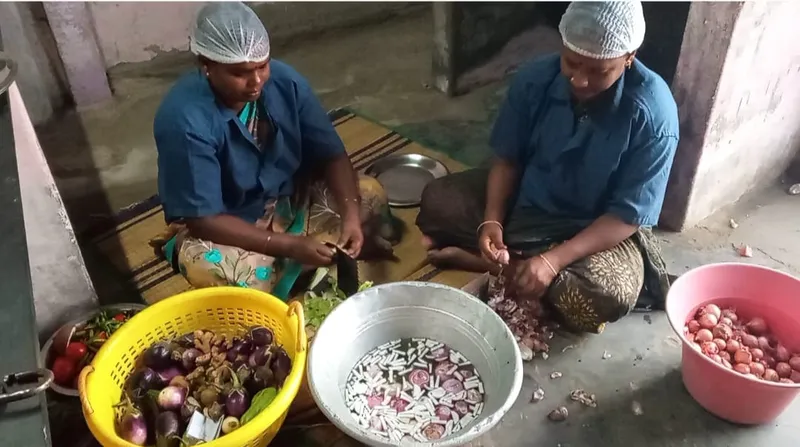These Tamil Nadu fisherwomen are carving their legacy with local seafood delicacies
Dolphin Unavagam, an eatery in Poompuhar in Tamil Nadu, is the labour of love of six fisherwomen who decided to change their fate with their cooking skills.
For Stella Gracy and her fellow fisherwomen in the Poompuhar district of Tamil Nadu, a regular day would involve waiting for their husbands to return from the sea with the day’s catch and sell the fare in the market.
While some days would fetch a good return, on other days when there was not enough seafood to sell, their families would go hungry and struggle to make ends meet.
Meanwhile, the harbour—which saw hundreds of men sailing in and out—had no place for them to rest, eat, or refresh.
After witnessing this arduous life, Gracy, along with five fisherwomen—Silvarani, Uma, Rajakumari, Saroja, Raja Ramani, and Geetha—decided to take matters into their own hands in 2016.
“We couldn’t go into the waters to fish, but what we did have was the wealth of seafood recipes that our mothers and grandmothers had passed down to us,” Gracy says.
Deciding to put their strengths to use, the women took out a microfinance loan of Rs 50,000 and set up an eatery that functioned out of a hut.
They started serving snacks, full-course meals, and the legendary meen kuzhambu (fish gravy popular in South India) for load men and fishermen visiting the shores.
Unprecedented success
Today, the small eatery has grown into a full-fledged restaurant called Dolphin Unavagam (eatery). Not only have they paid back the loan, but each woman in the group now makes close to Rs 20,000 every month.
Besides the freshly prepared food, Gracy and the other ladies also sell fish and prawn pickles that have become a hit among villagers and travellers alike.

The women make close to Rs 15,000 each per month.
Except for Gracy—a college graduate—the rest of the women are school dropouts, who decided to leave behind years of patriarchy and alcohol abuse to become businesswomen in their own right.
For instance, 48-year-old Raja Ramani has weathered many storms in her life, including losing her husband to murder and, later, her sister to suicide in the sea. She had discontinued school as a child to help her mother in odd jobs, where she faced abuse and neglect.
“Starting a business of my own is, in many ways, about reclaiming the opportunities I lost as a child, and what better way to do this than to cook for and feed people—something me and my siblings rarely experienced while growing up,” she says.
“I also recognised the importance of turning the tides forever for my daughters,” she adds.
Ramani sent her elder daughter Vijayalakshmi to Stavropol State University in Russia to study medicine. Vijayalakshmi is now back in India and is a practising doctor, while her sister and Rajamani’s second daughter is a civil service aspirant.
Rajakumari is an Irula tribal woman who had lost everything, including her daughter to the tsunami in 2004. She started afresh with the fishing vessel she received under the Chief Minister’s relief programme as a livelihood option.
From then to now, she knows she has come a long way.
In fact, she is among the few women who set into the sea to catch fish—something only men have been doing for decades. While many wives and mothers in fisher families lose their husbands to alcohol, Rajakumari is proud to have started a business, where she can cook what she harvested.
During the COVID-19 pandemic, the women catered for weddings and birthday functions, compensating for the loss of their regular business.
Opportunities keep knocking
Around the pandemic, Gracy and her team also received a tender from the state tourism department to set up a stall between the Poompuhar bus stand and the beach.
For the last three years, they have been selling their popular fish fry here and have also earned a name in the village for being the women with the best home-style seafood recipes.
“We started the stall because we couldn’t rely on the erratic income from fishing. We have been taunted by men for running a business and taking charge. We tuned out all the discouragement, and that has helped us set up Dolphin,” says Gracy.
With its success, Gracy says their families, husbands, and village folks have become their biggest cheerleaders.
“The years and the success have also changed the dynamics at home. Our husbands share cooking and cleaning responsibilities, as we compensate for the income on days they don’t make enough. We have earned dignity and respect within our homes, which is the most heartwarming thing for us,” she says.
Edited by Suman Singh







